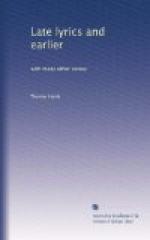I would not have alluded in this place or anywhere else to such casual personal criticisms—for casual and unreflecting they must be--but for the satisfaction of two or three friends in whose opinion a short answer was deemed desirable, on account of the continual repetition of these criticisms, or more precisely, quizzings. After all, the serious and truly literary inquiry in this connection is: Should a shaper of such stuff as dreams are made on disregard considerations of what is customary and expected, and apply himself to the real function of poetry, the application of ideas to life (in Matthew Arnold’s familiar phrase)? This bears more particularly on what has been called the “philosophy” of these poems—usually reproved as “queer.” Whoever the author may be that undertakes such application of ideas in this “philosophic” direction—where it is specially required—glacial judgments must inevitably fall upon him amid opinion whose arbiters largely decry individuality, to whom ideas are oddities to smile at, who are moved by a yearning the reverse of that of the Athenian inquirers on Mars Hill; and stiffen their features not only at sound of a new thing, but at a restatement of old things in new terms. Hence should anything of this sort in the following adumbrations seem “queer “—should any of them seem to good Panglossians to embody strange and disrespectful conceptions of this best of all possible worlds, I apologize; but cannot help it.
Such divergences, which, though piquant for the nonce, it would be affectation to say are not saddening and discouraging likewise, may, to be sure, arise sometimes from superficial aspect only, writer and reader seeing the same thing at different angles. But in palpable cases of divergence they arise, as already said, whenever a serious effort is made towards that which the authority I have cited—who would now be called old-fashioned, possibly even parochial—affirmed to be what no good critic could deny as the poet’s province, the application of ideas to life. One might shrewdly guess, by the by, that in such recommendation the famous writer may have overlooked the cold-shouldering results upon an enthusiastic disciple that would be pretty certain to follow his putting the high aim in practice, and have forgotten the disconcerting experience of Gil Blas with the Archbishop.
To add a few more words to what has already taken up too many, there is a contingency liable to miscellanies of verse that I have never seen mentioned, so far as I can remember; I mean the chance little shocks that may be caused over a book of various character like the present and its predecessors by the juxtaposition of unrelated, even discordant, effusions; poems perhaps years apart in the making, yet facing each other. An odd result of this has been that dramatic anecdotes of a satirical and humorous intention (such, e.g., as “Royal Sponsors”) following verse in graver voice, have been read as misfires because they




